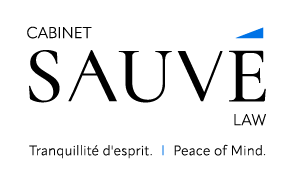What is Title Insurance and Why Do I Absolutely Need It in Ontario?
What every Ontario homebuyer needs to know about securing their legal ownership
For most Ontarians, buying a home is the largest and most significant financial investment they will ever make. It's a dream come true, a place to build memories, and a cornerstone of your financial future. As you navigate the exciting (and sometimes overwhelming) journey of purchasing property, you'll encounter various legal terms and documents – one of which is Title Insurance.
Often, buyers see the line item for "Title Insurance" on their closing statement, understand it’s a cost, but aren't entirely sure what it is or why it's necessary. Is it just another fee? Or is it a crucial layer of protection?
At Cabinet Sauvé Law, serving clients across Ontario from our offices in Ottawa, Barrie, and Rockland, we believe in empowering our clients with knowledge. We understand that "peace of mind" isn't just a saying; it's what every homeowner deserves. That’s why we’re going to demystify title insurance, explaining in plain language what it is, what it protects against, and why it's an indispensable safeguard for your Ontario property.
Understanding "Title" – The Foundation of Your Home
Before we dive into title insurance, let's clarify what "title" actually means in the context of real estate.
Simply put, the title to a property refers to the legal right of ownership. It's the evidence that you genuinely own the land and any structures on it. When you purchase a property, your lawyer performs a "title search" to confirm that the seller legally owns the property and has the right to transfer it to you. This search also reveals any existing claims, liens, or encumbrances against the property that could affect your ownership.
A "clean title" means there are no outstanding issues, disputes, or hidden claims that could jeopardize your ownership rights. Title insurance is designed to protect you if, despite all the checks and balances, a problem with the title emerges after you've closed the deal.
SO, What Exactly Is Title Insurance?
Title insurance is a one-time premium payment for an insurance policy that protects both the homeowner (you) and your lender (the bank) against financial loss due to defects in the title to your property. It’s fundamentally different from other types of property insurance (like home insurance, which protects against fire or theft), as it focuses on issues related to ownership history rather than physical damage.
Think of it as a comprehensive safety net that covers you from unforeseen legal challenges to your property rights that originated before you even owned the home.
The policy is issued by a title insurance company, and it provides coverage for as long as you own the property. You pay a single premium at the time of purchase, and no further payments are required.
Why the Traditional System Isn't Enough Anymore
Historically, lawyers would conduct exhaustive title searches, examining every document registered against a property going back 40 years or more. While this process was thorough, it was also time-consuming, expensive, and crucially, could not protect against all possible hidden risks.
In today's fast-paced real estate market, with increased complexities and potential for fraud, title insurance has become an essential part of nearly every real estate transaction in Ontario. It provides a level of protection that even the most meticulous traditional title search cannot offer.
What Hidden Dangers Does Title Insurance Protect You From?
This is where title insurance truly shines. It covers a wide array of potential problems that could arise, many of which are impossible to detect even with extensive due diligence. Here are some of the most common and impactful issues:
1. Fraud, Forgery, and Impersonation
This is perhaps one of the most frightening risks, and it's on the rise. Imagine:
- Someone impersonates the true owner and sells the property to you, taking your money and leaving you with no legal title.
- A forged power of attorney is used to sell the property without the owner's consent.
- Identity theft leads to an innocent owner's property being transferred fraudulently.
Without title insurance, if you become the victim of such fraud, you could lose your entire investment, including your home. Title insurance protects you by covering the legal costs to defend your ownership and, if necessary, compensating you for your financial loss.
2. Undisclosed Liens and Encumbrances
A lien is a legal claim against a property, usually for an unpaid debt. If a previous owner failed to pay taxes, a contractor, or even a past judgment, that lien could still be attached to the property and become your responsibility after closing.
- Unpaid property taxes: You could be liable for years of unpaid taxes from a previous owner.
- Unpaid utility bills: Sometimes, utility arrears can create a lien on the property.
- Construction liens: A contractor who wasn't paid by the previous owner could place a lien on your new home.
- Judgment liens: If a previous owner lost a lawsuit and owes money, the court can place a lien on their property.
Title insurance covers the costs to clear these liens, ensuring you don't have to pay for someone else's debts.
3. Survey Irregularities and Boundary Disputes
Surveys can be old, inaccurate, or non-existent. Over time, property lines can become unclear, leading to disputes with neighbours.
- Encroachments: A fence, shed, or even part of a building on your property might actually be encroaching onto your neighbour's land, or vice-versa. Title insurance can cover the cost of removing the encroachment or compensating you for lost land.
- Errors in a survey: An outdated or incorrect survey could lead to disagreements over the true boundaries of your property.
4. Unregistered Easements or Rights-of-Way
An easement is a right for someone else to use a portion of your property for a specific purpose (e.g., a utility company having the right to access poles on your land, or a neighbour having a right-of-way to cross your property to access their own).
- Undisclosed Easements: If an easement wasn't properly disclosed or registered, it could limit your use of the property or affect its value. Title insurance can protect you if such an easement is discovered after you buy the home.
5. Zoning and Bylaw Violations
Municipalities have strict rules about how property can be used and what types of structures can be built.
- Unpermitted Renovations: A previous owner might have built an addition, deck, or basement apartment without obtaining the necessary permits. If the municipality discovers this after you buy, they could order you to tear it down or bring it up to code, at your own expense.
- Zoning Violations: The property might not comply with current zoning bylaws (e.g., if a previous owner operated a business from a residential home, or if the property's use changed).
Title insurance can cover the costs associated with rectifying these issues, provided you were unaware of the violation at the time of purchase.
6. Errors or Omissions in Public Records
Mistakes happen. Despite best efforts, errors can occur in the land registry office or other public records. These errors could impact your legal ownership. Title insurance provides a safeguard against these clerical mistakes.
7. Undiscovered Wills or Missing Heirs
In some rare but impactful cases, a will could be discovered after the sale that changes who legally owned the property. Or, an unknown heir of a previous owner could come forward to claim a share of the property, challenging your ownership. Title insurance offers protection against these unforeseen claims.
What Title Insurance DOES NOT Cover
It's important to understand the limitations of title insurance. It generally does not cover:
- Known issues: Problems that you were aware of before closing, or that would have been revealed by a new survey (if one was requested and provided).
- Environmental hazards: Issues like mould, asbestos, or lead paint. These fall under a general home inspection.
- Physical defects: Problems with the house structure, appliances, or systems (e.g., a leaky roof, faulty furnace). These are covered by a home inspection.
- Future events: Issues that arise after you own the property and are within your control (e.g., you fail to get a permit for your own renovation).
How Does Title Insurance Work in Ontario?
- Application: Your real estate lawyer will arrange for the title insurance policy as part of your closing process. They will provide the necessary information to the title insurance company.
- One-Time Premium: You pay a single premium at closing. The cost varies depending on the purchase price of the property, but it is typically a few hundred to a thousand dollars.
- Coverage: The policy is effective from the date of closing and remains in effect for as long as you own the property.
- Claim: If a covered title defect arises, you or your lawyer notify the title insurance company. The company will then work to resolve the issue, either by covering legal costs, fixing the defect, or compensating you for your financial loss.
Why DO Lenders Require TITLE INSURANCE?
It's also important to note that if you are getting a mortgage, your lender will almost certainly require title insurance. This is because the lender also wants to protect their investment. If there's a problem with the title, it affects the security for their loan. The policy you purchase typically covers both your interest as the homeowner and the lender's interest.
The Peace of Mind Investment
Considering the magnitude of buying a home, the relatively small, one-time cost of title insurance is an incredibly worthwhile investment in your peace of mind. It provides a robust shield against unforeseen legal challenges that could otherwise cost you tens of thousands of dollars, or even your home itself.
At
Cabinet
Sauvé Law, we see title insurance not as an optional add-on, but as a crucial component of protecting your property investment. It ensures that when you receive the keys to your new home—whether in
Simcoe County, Muskoka, the Ottawa and Rockland areas, or elsewhere in Ontario—you can do so with confidence, knowing that your ownership is securely protected. We guide our clients through every step of the real estate transaction, making sure they understand all the protections in place, so they can enjoy their new property without worry.
Don't leave your largest investment vulnerable to hidden risks. Talk to us about title insurance as part of your next real estate transaction.




